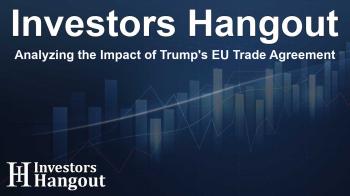Analyzing the Impact of Trump's EU Trade Agreement

Understanding Trump's EU Trade Agreement Claims
Recently, President Donald Trump announced a new trade agreement with the European Union that he describes as "the biggest deal ever reached in any capacity." This statement sparked diverse reactions, particularly from critics who are questioning the tangible benefits behind his assertions.
Critiques and Skepticism Surrounding the Deal
On a recent edition of the Prof G Markets podcast, co-host Ed Elson raised concerns about Trump's characterization of the agreement. He emphasized that what the President presented was merely a framework, suggesting that all elements are still open to modification. This means that much of the enthusiasm surrounding the agreement may be misplaced.
Elson pointed to previous instances where Trump made grandiose commitments that did not materialize, such as a promised $200 billion investment from China and a $600 billion commitment from Saudi Arabia, both of which fell short. This pattern gives rise to skepticism regarding the current EU deal.
Economic Implications and Potential Outcomes
Focusing on the implications of the recent agreement, Elson noted comments from Japan's chief negotiator about the investment structure where a mere 1% of the anticipated $750 billion spend on American energy would actually benefit the US directly. The remainder could be considered loans rather than direct investments.
Perspectives from Economists and Analysts
While some view this agreement skeptically, NYU Professor Scott Galloway argues that there could be some merit to Trump's position. He suggests that, irrespective of the international dynamics, this might be considered a minor victory for the Trump administration, albeit labeled a "lowercase win." The implications of public perception can often outweigh the actual benefits derived from agreements.
What Economists Say About the EU Agreement
Leading economists are expressing that the EU deal may not bode well for American consumers, particularly as they might face the burden of increased tariffs, estimated at around 15%. These financial implications signal potential rises in consumer goods, leading to concerns on how the general public might ultimately be affected.
Nevertheless, some analysts have taken a more favorable stance. They argue that the deal could be beneficial for U.S. stock markets by alleviating uncertainties previously haunting these markets. Given that the tariffs are lower than previous fears suggested, some believe that this could lead to positive market reactions.
Strategic Insights into Future Trade Dynamics
As this agreement unfolds, the strategic advantage for the U.S. remains a topic of vigorous debate. Critics assert that the optics of the deal might hold more weight than its actual substance, as evidenced by Galloway’s comments that suggest the need for a positive narrative against the backdrop of ongoing complexities in international relations.
Thus, whether this agreement becomes a substantive victory or remains a press-release-driven initiative is yet to be seen. The discussions surrounding it underscore the ongoing challenge of delivering lasting economic benefits without losing sight of the realities of international trade.
Frequently Asked Questions
What is the main claim surrounding Trump's EU trade agreement?
Trump claims it to be the largest deal ever, though critics argue it is merely a framework.
What do experts say about the economic implications of this deal?
Experts have mixed views, with some believing it could raise tariffs on consumers while others see potential stock market benefits.
Is there skepticism regarding the actual benefits from the deal?
Yes, critics highlight past unfulfilled commitments that raise questions about this agreement's validity.
How does the deal affect American consumers directly?
Consumers might face higher prices due to potential tariffs from the EU agreement.
What role does public perception play in this trade deal?
Public perception could influence how the deal is viewed, regardless of its actual economic benefit.
About The Author
Contact Riley Hayes privately here. Or send an email with ATTN: Riley Hayes as the subject to contact@investorshangout.com.
About Investors Hangout
Investors Hangout is a leading online stock forum for financial discussion and learning, offering a wide range of free tools and resources. It draws in traders of all levels, who exchange market knowledge, investigate trading tactics, and keep an eye on industry developments in real time. Featuring financial articles, stock message boards, quotes, charts, company profiles, and live news updates. Through cooperative learning and a wealth of informational resources, it helps users from novices creating their first portfolios to experts honing their techniques. Join Investors Hangout today: https://investorshangout.com/
The content of this article is based on factual, publicly available information and does not represent legal, financial, or investment advice. Investors Hangout does not offer financial advice, and the author is not a licensed financial advisor. Consult a qualified advisor before making any financial or investment decisions based on this article. This article should not be considered advice to purchase, sell, or hold any securities or other investments. If any of the material provided here is inaccurate, please contact us for corrections.

